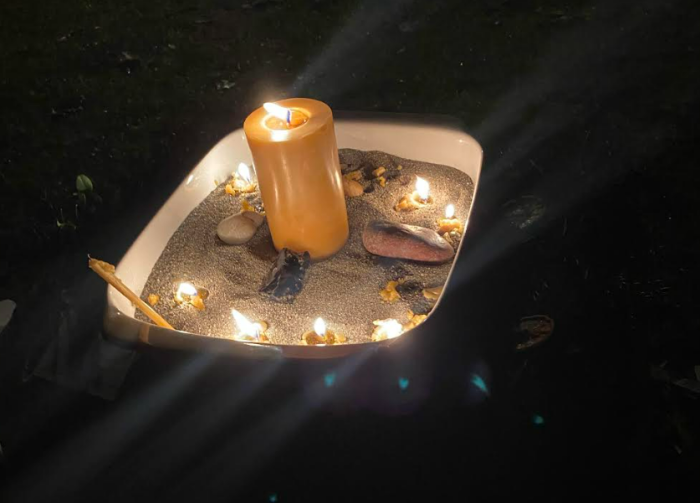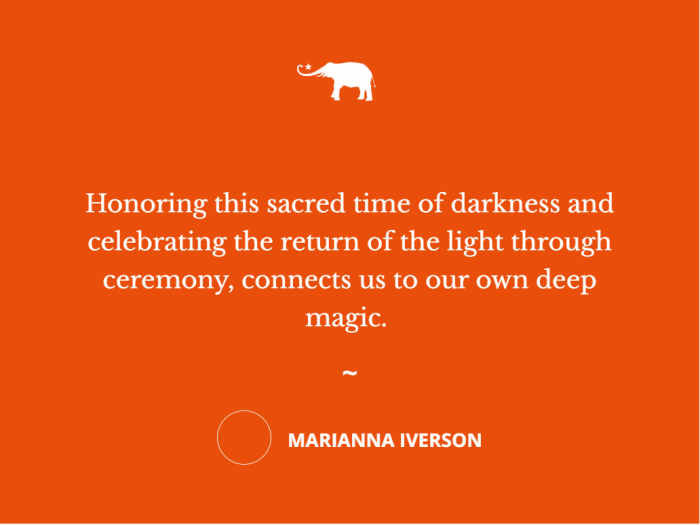
Honoring Darkness: Ceremony Guidance for Winter Solstice
The wheel of the year turns toward darkness. Calling us inward. Longer nights and less doing provide the perfect opportunity to gather ourselves in and look at what really matters, and what we want to create in the coming months.
Throughout history, winter was a time when people came in from their work on the land—gathered together in homes lit by candles and heated by wood. People practiced handcrafts, told stories, and engaged in celebrations of the darkest night of the year and the return of the sun.
In our current time where we live lives of constant summer, homes heated to a perfect 72° year-round, and electric lights creating daylight long after the sun has gone to bed, it’s easy to feel disconnected from the wheel of the year—from the limits that were a daily reality of our ancestors’ lives.
We live lives of inconceivable comfort and endless distraction.
While these comforts are most welcome, and most of us don’t desire to go back to a time when we had only candlelight and lanterns to light our homes, or wood stoves to heat them, there is something precious about remembering these old ways. Something tender about honoring the seasons as they change and creating ways in our busy modern lives to slow down and be with the darkness.
It’s less than a week until winter solstice.
Many humans are busily getting ready for whichever winter holiday they celebrate, and while the hustle and bustle can feel good—exciting even—there can also be a sense of exhaustion, burnout, and a lack of the deep meaning that our souls long for.
Solstice celebrations were at one time, and still are in some communities and parts of the world, a time for humans to come together and honor the sacred in their lives. To gather in a good way and create ritual, song, and feasting to celebrate being alive and surviving through the dark times of the year.
In the frenetic, capitalist-driven holiday celebrations that so many of us are too familiar with, there is not much sense of the sacred. Post-holiday slumps and seasonal depression point towards something that is not spoken about enough. We were born for more than this. We were born to be part of connected communities that live a life guided by the wheel of the year. Honoring and celebrating the changing of the seasons and the significance and meaning of being a human being alive in a living world.
What if we decided to do it all differently…
What if we turn away from what feels like necessary spending, and towards time together? Creating bonds of community and kinship, and rituals to celebrate and embrace this season in the way that our ancestors before us have done back and back and back through time.
In my work as a ceremonialist, I treasure the opportunity to craft ceremonies to honor the cycles and seasons in our natural world, and in our human lives.
Ceremonies enacted by a community when well-crafted and held, can be powerful and connecting experiences. Self-guided individual ceremonies can also be powerful and connecting experiences—connecting the individual to the divine, the more than human world, ancestors, and our own souls.
I have found for many people who are longing to bring ceremony into their lives that there is a sense of “I don’t quite know how to do it…” This makes perfect sense considering that ceremony is deeply lacking from the fabric of our modern lives. If we didn’t grow up in communities that practice ceremony together it is unlikely that we will have confidence in creating ceremonies of meaning for ourselves, or our communities.
I will share here some simple ideas that you can work with, mold to fit your own needs, to create a ceremony to honor this coming solstice.
>> Set an intention—what are you hoping to offer and receive in your ceremony? Sit with this question, a pen and paper, and give yourself time to feel what it is that you are really longing to bring forward through your ceremony.
>> Winter solstice is a time to honor the darkness and celebrate the return of the light. Consider using darkness and light in your ceremony. Dimming the lights in your home, sitting in prayer and meditation, and then lighting a candle to symbolize the sun and the beauty of this constant force in our lives, returning again to bring light and warmth to the land.
>> What are you longing to release in your life? What are you longing to call in? Use strips of paper to write down one thing you are releasing, and one thing you are calling in. You could burn these paper strips with your candle, or in a fire. You could also bury them in the earth, tucked in tight like seeds waiting for the sun to kiss them and call them forth into new life. Even the things that we are releasing, the things we don’t want to carry anymore, can be transmuted through the power of the earth, the elements, and time, into something new, whole, and beautiful.
>> Close your ceremony with some words of gratitude and thanks for the gifts that have been given in this life. It is important to have an opening and a closing to each ceremony. If you have called in helping powers, ancestors, or guides, make sure to communicate that the ceremony is ending and thank them for their support.
You can use these suggestions to create a ceremony for yourself or to be enacted with a group of friends, or an extended community.
Trust your guidance and intuition as you prepare for your ceremony. Gather candles, stones, and sacred tools that you wish to use in your ceremony. Trust that you cannot do this wrong. Your offering will be well received if you proceed with a clear intention and an open heart.
Creating ceremonies can bring richness and depth to this time of the year, and bring you closer to your own soul’s deep longing to live a life of meaning and purpose. Connected deeply to the sacred, to ancestral traditions, and to the unique beauty that you were born to bring forth into this world. May you be held gently in this tender time of darkness, and may the sun return to warm your face and your heart in the months to come.
~
author: Marianna Iverson
Image: Author's Own
Editor: Molly Murphy


This account does not have permission to comment on Elephant Journal.
Contact support with questions.